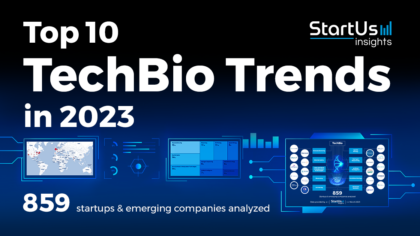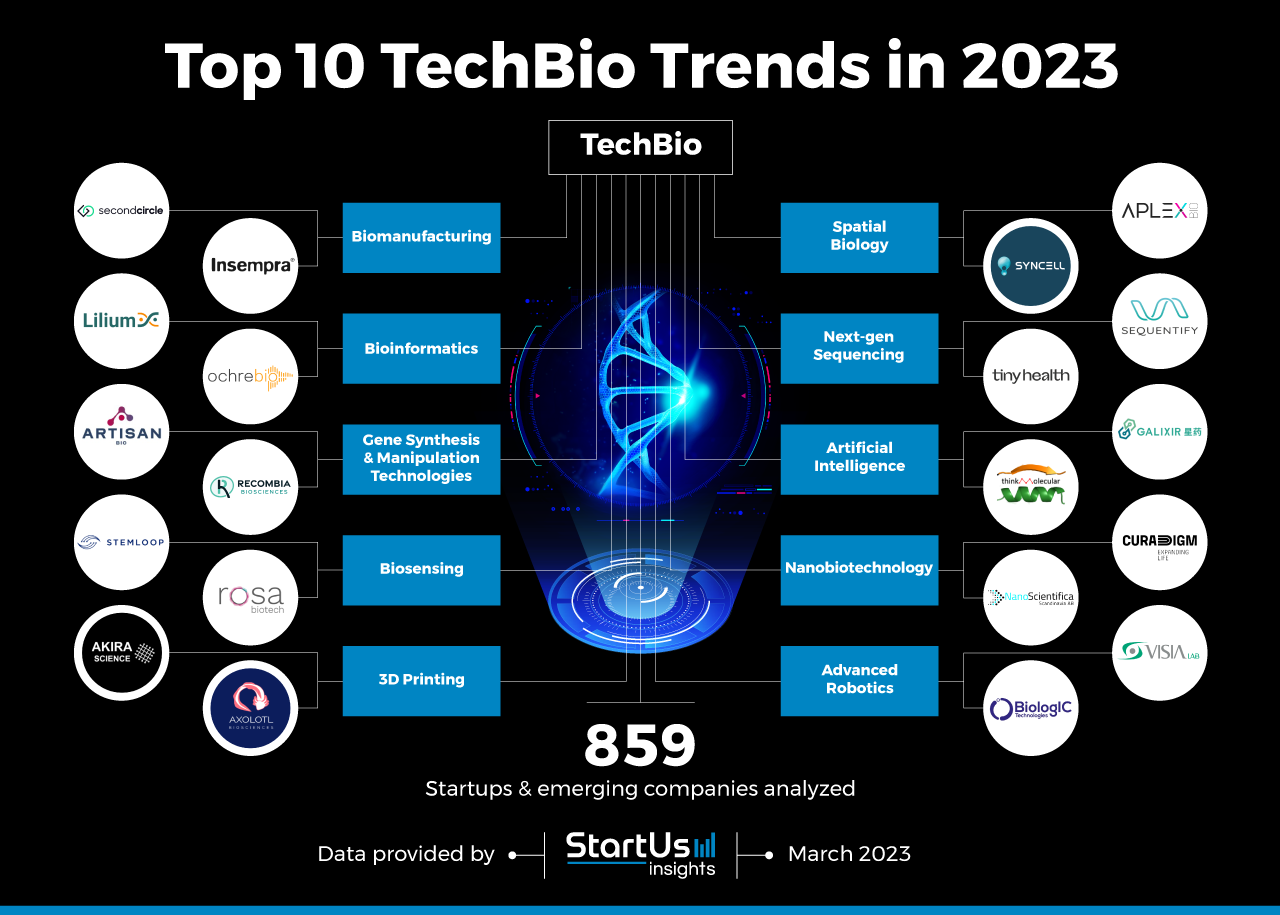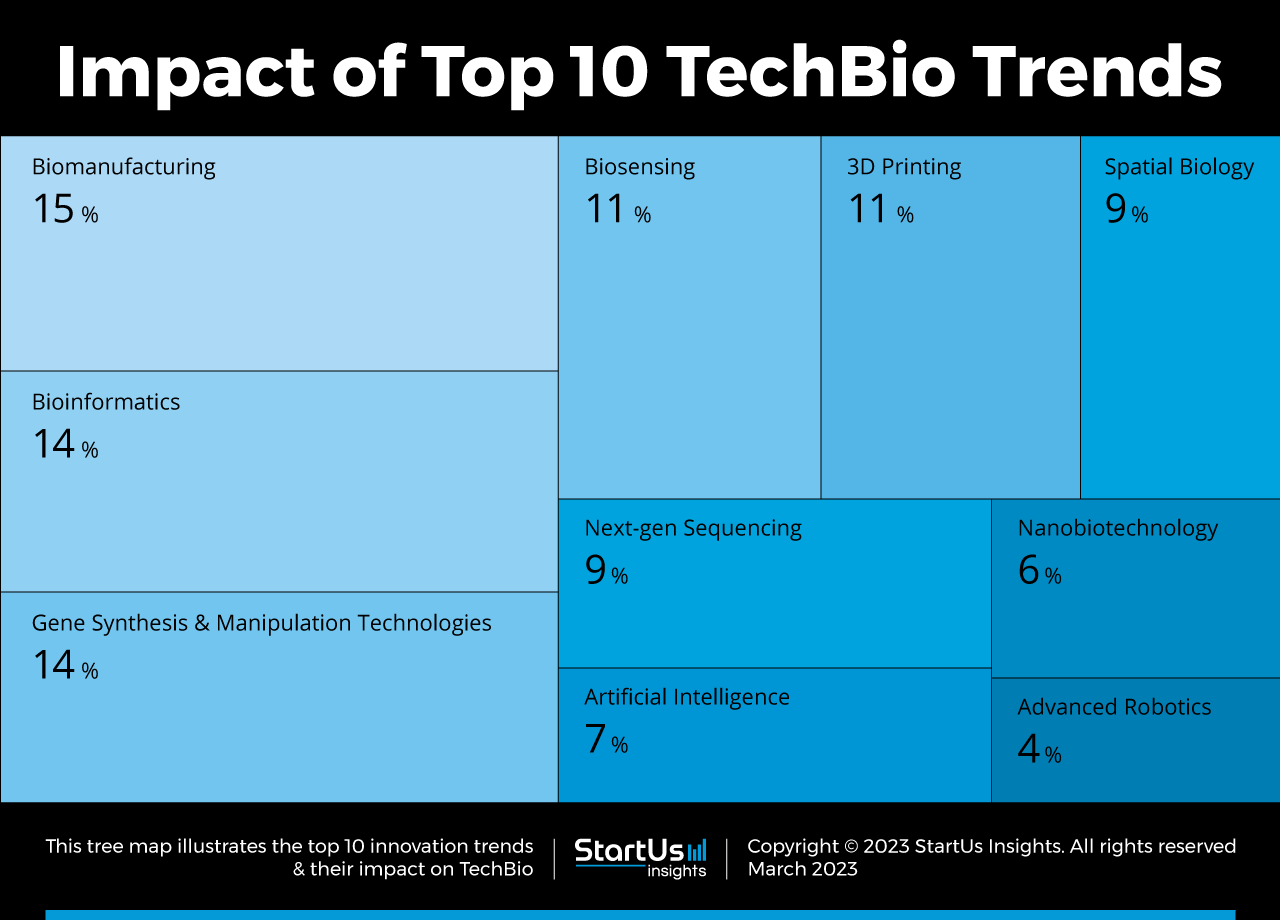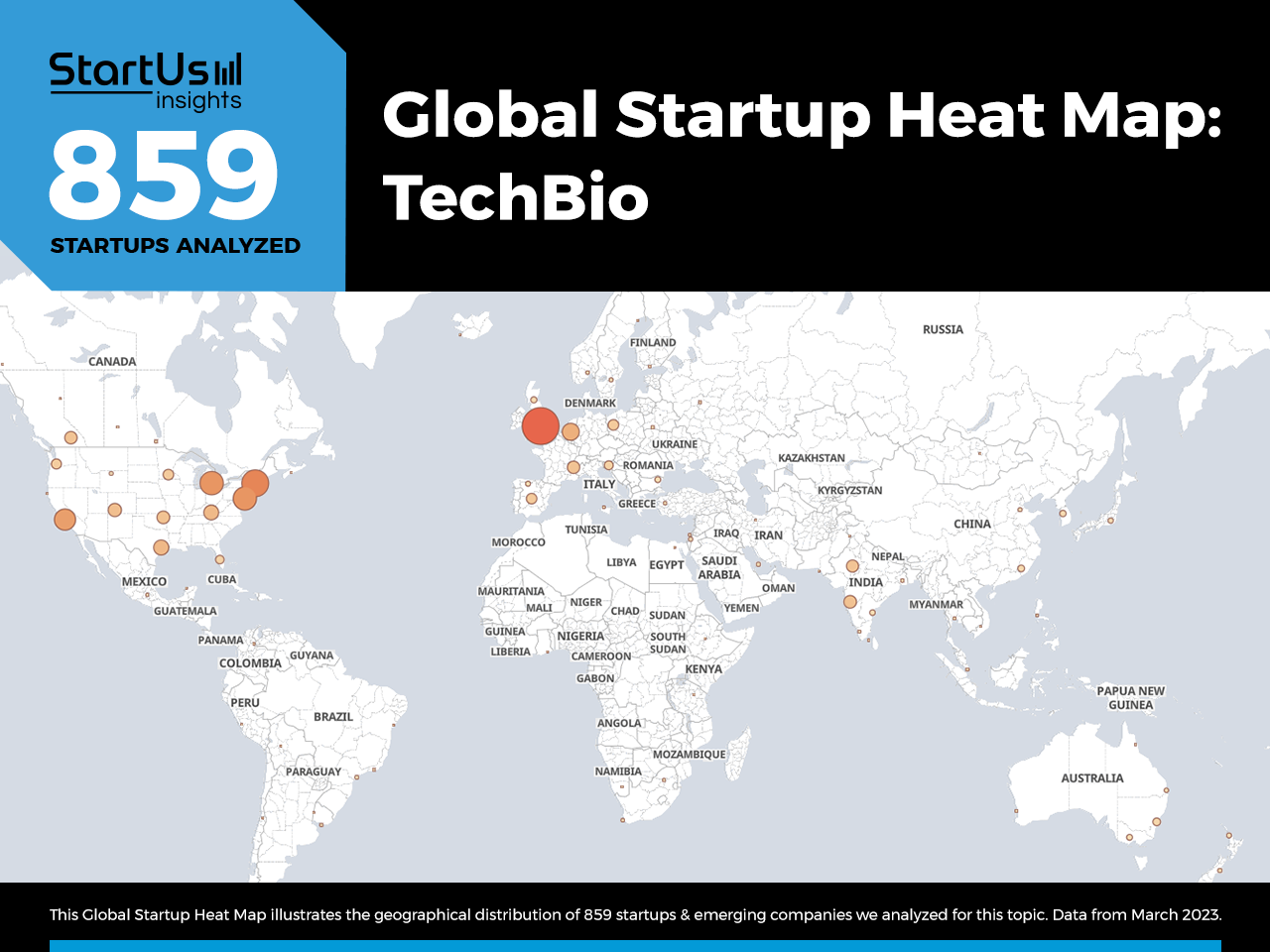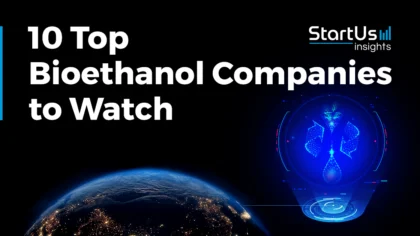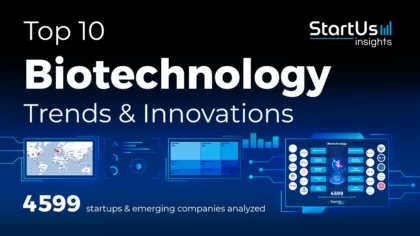TechBio is a rapidly growing field that combines technology and biology. It involves the application of technology to study and manipulate biological systems and processes. Innovative techbio startups develop solutions for healthcare, agriculture, sustainability, and more. They encompass a wide range of fields including bioinformatics, genomics, spatial biology, and more. TechBio relies heavily on technologies such as next-gen sequencing (NGS), artificial intelligence (AI), biomanufacturing, and biosensors. Advances in these specializations promote the development of precision medicine, and the engineering of microorganisms for the production of biofuels, among other novel applications. These techbio trends in 2023 hold the promise to improve many aspects of human lives, from healthcare and agriculture to environmental sustainability.
Innovation Map outlines the Top 10 TechBio Trends & 20 Promising Startups
For this in-depth research on the Top 10 TechBio Trends & Startups, we analyzed a sample of 859 global startups & scaleups. This data-driven research provides innovation intelligence that helps you improve strategic decision-making by giving you an overview of emerging technologies in the biotech industry. In the TechBio Innovation Map below, you get a comprehensive overview of the innovation trends & startups that impact your company.
These insights are derived by working with our Big Data & Artificial Intelligence-powered StartUs Insights Discovery Platform, covering 3 790 000+ startups & scaleups globally. As the world’s largest resource for data on emerging companies, the SaaS platform enables you to identify relevant technologies and industry trends quickly & exhaustively.
Tree Map reveals the Impact of the Top 10 TechBio Trends
Based on the TechBio Innovation Map, the Tree Map below illustrates the impact of the Top 10 TechBio Trends in 2023. Startups and scaleups are using synthetic biology to achieve higher yields and precision in the manufacturing of biological products. The field of biomanufacturing has seen remarkable progress due to advances in gene synthesis and manipulation, bioinformatics, biomanufacturing, and 3D printing. Technologies such as biosensing, AI, and spatial biology offer valuable insights into the intricate world of biology, further improving the precision of biological product manufacturing. NGS, nanobiotechnology, and advanced robotics facilitate production at a molecular scale, enabling new frontiers in biotechnology. The future of biomanufacturing belongs to companies that harness these powerful tools and technologies & pave the way for a healthier and more prosperous future.
Top 10 TechBio Trends in 2023
- Biomanufacturing
- Bioinformatics
- Gene Synthesis & Manipulation Technologies
- Biosensing
- 3D Printing
- Spatial Biology
- Next-gen Sequencing
- Artificial Intelligence
- Nanobiotechnology
- Robotics
Global Startup Heat Map covers 859 TechBio Startups & Scaleups
The Global Startup Heat Map below highlights the global distribution of the 859 exemplary startups & scaleups that we analyzed for this research. Created through the StartUs Insights Discovery Platform, the Heat Map reveals high startup activity in the UK, followed by the US, India, and Europe. Below, you get to meet 20 out of these 859 promising startups & scaleups as well as the solutions they develop. These techbio startups are hand-picked based on criteria such as founding year, location, funding raised, & more. Depending on your specific needs, your top picks might look entirely different.
Top 10 TechBio Trends in 2023
1. Biomanufacturing
Biomanufacturing produces biological products with living cells or organisms, through the use of advanced biotechnology. In techbio, it involves cell culture, fermentation, purification, and formulation. For example, cell culture cells grow in a precisely controlled environment using machine learning sensors and high-proof screening. Biomanufacturing also leverages chromatography and precision fermentation to produce ingredients and chemicals. Biomanufacturing is a critical part of the techbio industry and revolutionizes the production of biopharmaceuticals and other biological raw materials. The use of living cells and organisms further allows for the production of complex and highly specific products that are difficult or impossible to produce by traditional chemical synthesis methods.
SecondCircle makes Carbon Negative Chemicals
Dutch startup SecondCircle captures industrial emissions. The startup designs emission control technology to convert carbon dioxide (CO2) into chemicals and proteins using bacteria. The startup’s carbon-negative chemical manufacturing reduces the amount of CO𝟸 in the industrial process. It replaces traditional greenhouse gas and fossil fuel emissions with carbon-negative alternative technologies. Companies with high emission rates, such as energy producers, manufacturing sectors, and food manufacturers, use this solution to shift towards a circular economy.
Insempra grows Functional Ingredients
German startup Insempra uses precision fermentation to grow customized materials. The technology utilizes various microorganisms, such as yeast and bacteria, to serve as biological factories. Insempra produces lipids, fibers, and bioactive ingredients for cosmetic and food applications, replacing agricultural and petrochemical lipids. In both dry and wet labs, Insempra tests and pilots solutions for the required ingredients. The startup validates the process through a pilot formulation and also provides various iterations. The personal and skin care industries utilize Insempra to create new bioactive care products.
2. Bioinformatics
Bioinformatics is a discipline that integrates biology and computer science to process, store, and analyze vast amounts of biological data, including DNA sequences, protein structures, and gene expression data. It plays a vital role in drug discovery, genomics research, and personalized medicine, enabling researchers to identify drug targets, comprehend the genetic origins of diseases, and create tailored treatments based on an individual’s genetic information. As an advancing field, bioinformatics startups continue to deliver novel solutions with upgraded technologies and new approaches.
LiliumX constructs Complex Biologics
UK-based startup LiliumX uses protein conjugation technologies to uncouple drug candidate preparation from design. The startup’s modular approach designs drug candidates with custom modifications to create therapeutics. LiliumX’s Universal Assembly Platform provides both combinatorial scale and drug format complexity. This overcomes the limits of traditional bispecific drug discovery. Moreover, the solution enables unmatched integration of binders, complex bispecific formatting, and modification. The platform works with antibody fragments, other proteins, and natural ligands. LiliumX’s complex protein production processes speed up overall drug manufacturing as well.
Ochre Bio develops Therapies for Chronic Liver Diseases
UK-based startup Ochre Bio designs RNA therapies for chronic liver diseases. The startup uses a combination of genomic deep phenotyping, precision RNA medicine techniques, and tests in human donor livers. Its deep phenotyping technology provides evaluations in vivo, imaging, clinical and anatomic pathology to characterize multisystemic phenotypes or syndromes. Moreover, the startup designs and reprograms precision liver therapies and validates regenerative human liver tissue models. Medical care centers use Ochre Bio’s solution to cut costs for liver disease treatment.
3. Gene Synthesis & Manipulation
Gene synthesis and manipulation is the process of altering the genetic material of an organism, typically by inserting or deleting specific genes. This technology is at the forefront of genetic engineering and has far-reaching applications in medicine, agriculture, and energy. Gene synthesis involves designing and constructing new genes in a laboratory, enabling the creation of entirely new biological systems. This has the potential to facilitate the development of new drugs, materials, and energy sources, as well as to create precision therapeutics, high-yielding crops, and microorganisms to produce specific compounds. Overall, gene synthesis and manipulation represent one of the most prominent trends in TechBio, with significant implications for human health, food security, and sustainable energy.
ArtisanBio develops CRIPR-driven Cell Therapies
US-based startup ArtisanBio offers CRISPR-based cell therapy. Artisan’s 1-Stop Shop provides an engineering platform to transition first-generation Chimeric antigen receptor-T (CAR-T) into next-generation CAR-X. Moreover, it increases the manufacturability, efficacy of drugs, and accessibility of treatment. Its 1-Stop Shop enables allogeneic edits, stealth edits, and dual-CAR knock-in. ArtisanBios’ solution accelerates treatment processes and provides a reduction of vein-to-vein time and cost.
Recombia Biosciences facilitates Genetic Modification of Yeast
US-based startup Recombia Biosciences improves yeast properties through genetic editing. Its technologies enhance brewing and fermentation by optimizing yeast through genome editing and Homology-directed repair (HDR) boosting techniques. This approach is tailored to address specific industrial manufacturing challenges and bottlenecks such as lifetime and productivity. Recombia Biosciences searches DNA bases, finds a sequence of bases of interest, and then replaces that sequence with a new sequence designed for particular yeast traits. These improved yeast cells are used by fermentation companies to increase yields.
4. Biosensing
Biosensing is a vital process that utilizes biological molecules or organisms to detect and measure specific target molecules. Its applications in techbio are numerous, including disease diagnosis, drug development, and environmental monitoring. Biosensors detect a wide range of analytes, including toxins, pathogens, and biomarkers of disease. Recent advances have increased their sensitivity, specificity, and speed. By integrating with other technologies like microfluidics and artificial intelligence, biosensor startups create powerful diagnostic tools that improve precision medicine, food safety, and environmental monitoring. The goal of biosensors is to create reliable, cost-effective, and easy-to-use technology for various settings.
Stemloop develops Cell-Free Biosensors
US-based Stemloop delivers critical information with accuracy and scale. The startup’s biosensor combines the power of cell-free synthetic biology with nature’s biosensing attributes. It provides actionable information to solve problems in biomanufacturing, environmental monitoring, and human health. These cell-free biosensors enable rapid, sensitive, and specific solutions for the detection of target analytes. Stemloop’s biosensors are engineered to inform decision-making in a fraction of the time.
Rosa Biotech enables AI-based Biosensing
UK-based startup Rosa Biotech provides AI-driven biosensing and diagnostics. It creates outcome-focused biosensing for early disease diagnosis and use in industrial biotechnology. The novel sensing platform, Pandra, leverages the rapid and precise approach to the olfactory systems of mammals. Moreover, it combines arrays of designed barrel-forming peptides with a back-end cloud database and proprietary ML algorithms. This creates a powerful biosensor for detecting diseases using patient samples. Further, Rosa’s arrays of peptides simultaneously interact with many small molecule biomarkers of disease to create a fluorescent fingerprint. Medical laboratories increase their efficiency in precision medicine with Rosa’s biosensing system.
5. 3D Printing
The use of 3D printing or additive manufacturing in biotechnology allows for the creation of intricate and customized structures with high precision and accuracy. This technology empowers tissue engineering, prosthetics and implants, drug delivery, and bioprinting. For example, 3D printing produces 3D scaffolds that simulate the natural architecture of tissues, enabling the development of functional tissues for transplantation or drug testing. The technology also finds use in the fabrication of personalized prosthetics and implants that match the patient’s anatomy. Additionally, 3D printing startups develop drug delivery solutions to produce customized devices, like implants or micro-needles, which release drugs in a controlled manner over time.
AKIRA Science manufactures Pliable Scaffolds
Swedish startup AKIRA Science uses 3D printing technologies to provide pliable scaffolds for soft tissue engineering. The solutions result from the synergistic combination of degradable polymer synthesis expertise and a mechanical simulation approach. The startup develops suitable scaffold designs to tailor to the biological needs of patients. The scaffolds are fabricated with AKIMed-c12, a high molecular weight linear semicrystalline poly(ether ester). It then prints linear, hexagonal, gradient, or staggered designs with adaptable pore sizes. Medical professionals utilize AKIRA’s solution for use in surgical and orthopedic applications.
Axolotl Biosciences designs Bio-Ink for Printing Tissue
Canadian startup Axolotl Bioscience creates a bio-ink for printing human tissue models. The reproducible neuro-bio-ink has versatile usability and compatibility with patients’ cells. Its TissuePrint is a fibrin-based neuro-bio-ink that supports different cell lines such as human induced pluripotent stem cells (hiPSCs), neural progenitor cells (NPCs), and mesenchymal stem cells (MSCs). The solution is compatible with extrusion-based bioprinters. It also generates stable and reproducible 3D structures. The use of neuro-bio-ink further allows for long-term usage and maintenance of high viability to promote neuronal differentiation. The compatibility and durability of the materials bring increased value to medical usage.

6. Spatial Biology
Spatial biology is a new approach in biotech research that studies how biological molecules and cells interact within their natural spatial environment. It finds applications in immunology, single-cell analysis, spatial transcription, and disease research. By analyzing the spatial relationship between cells and tissues during disease states, researchers better understand how diseases develop and progress. This leads to the identification of new drug targets and the development of more effective therapies. Spatial transcriptomics allows researchers to investigate the distribution of different cell types in space and detect variations in gene expressions resulting from treatment or disease. By investigating the production of proteins and gene expression of individual cells within their tissue surroundings, emerging solutions identify uncommon cell populations, define communication among cells, and monitor alterations in cells over time.
Syncell advances Proteme Identification
Taiwan startup Syncell delivers a subcellular image to let researchers isolate and identify proteins at a specific spatial location. Syncell’s Microscoop platform enables hypothesis-free subcellular spatial proteomics with high sensitivity and specificity. It enables researchers to discover proteins novel and specific locations of interest from cell and tissue samples. Pharmaceutical companies leverage the technology to research exact responses to drug treatments.
APLEX Bio creates Next-gen PCR Tests
Swedish startup Aplex Bio uses spatial biology to design next-generation polymerase chain reaction detection. Its HYPERPLEX hpPCR solution detects more than multiple targets in each sample instantly without genetic sequencing. The product has high sensitivity while retaining single molecule specificity, by novel hpPCR assay. This provides more accurate results and faster solutions for epidemic testing.
7. Next-gen Sequencing
NGS is an automated and high-throughput method for DNA sequencing that allows for the simultaneous sequencing of millions of DNA fragments, greatly increasing efficiency. NGS is mainly utilized for transcriptomics, epigenomics, and metagenomics and has significant applications in medicine, agriculture, and environmental science. It contributes to the development of new diagnostic tests, personalized medicine, and targeted therapies, and also improves the understanding of genetic diversity and evolution. The use of NGS is particularly useful in identifying new sources of genetic variation in agriculture and biotechnology, with its ability to detect even rare genetic variations.
Sequentify aids Targeted DNA Sequencing
Israeli startup Sequentify designs genomic diagnostics for a population-wide scale. Its platform technology enables a drastic reduction in the cost and time of genetic sequencing. The platform provides template extraction, target picking, and rapid sequencing in the first step. The second step provides barcoding, mapping alignment library preparation, noise reduction, and tertiary analysis of sequenced DNA. This two-step method provides better accuracy for genetic engineering companies.
Tiny Health simplifies Gut Microbiome Profiling
Irish startup Tiny Health profiles mothers’ and babies’ microbiomes to enable precision nutrition and therapy. Through at-home test kits, next-generation sequencing, a proprietary knowledge base, and AI, it provides key insights for newborn gut health. The test is a point-of-care (POC) or at-home sampling test that detects and transfers data to its app platform to display results in a short duration of time. This enables early imbalance detection and the healthy development of newborn babies.
8. Artificial Intelligence
AI is a crucial tool in the biotech industry that helps researchers analyze large amounts of data quickly and accurately. AI analyzes biological targets, chemical compounds, and their interactions to identify potential drug candidates, reducing costs, and increasing the chances of success. Precision medicine solutions utilize AI to analyze patient data, including genetic and clinical information, to develop personalized treatment plans that improve patient outcomes. AI also helps in identifying patterns and anomalies in medical images that are difficult for humans to detect. Such solutions also use gene expression patterns and DNA sequence data to identify new drug targets and potential disease biomarkers.
Galaxir accelerates Drug Research
Chinese startup Galixir employs artificial intelligence to accelerate drug research and development. The startup leverages advanced machine learning for innovative drug discovery (AIDD) and organically integrates computational chemistry and medicinal chemistry. It also collaborates with pharmaceutical companies and institutions globally to advance its drug discovery for multiple indications. Galixir optimizes preclinical R&D processes and provides potential drug candidates, which cuts time and costs.
thinkMolecular designs Molecular Simulations
Indian startup thinkMolecular provides molecular simulations in the field of new drug discovery. The startup employs physics-based and ML methods to address drug discovery problems from a molecular perspective. thinkMolecular addresses both the computational biology and chemistry aspects of drug discovery and provides an integrated approach with computational fluency. This solution enables cost-effective and precise drug development.
9. Nanobiotechnology
Nanobiotechnology combines nanotech and biosciences to develop new solutions for healthcare, energy, and environmental challenges. It utilizes nanoscale materials and tools to manipulate biological systems. Nanoparticles remove pollutants from water and air, offering potential solutions for environmental sustainability. Nanobiotechnology shows great potential in transforming the healthcare and energy sectors, among others. Nanotech startups create drug delivery systems with precise targeting and controlled release, as well as scaffolds for tissue engineering and contrast agents in medical imaging.
Curadigm redefines Therapeutic Bioavailability
French startup Curadigm shifts the paradigm of therapeutic clearance, bioavailability, and efficacy to improve treatment outcomes. Curadigm develops NanoPriming, a platform to increase bioavailability and efficacy while reducing off-target effects of drugs. The product enters the body intravenously just before the drug and “primes” the body to receive treatment by reduction of rapid therapeutic clearance and hepatic toxicity. Curadigm’s priming technology is flexible and adapts to work with nanomedicines, nucleic acid therapeutics, small molecules, and gene editing technologies. Medical centers use this technology to provide treatment with higher efficiency for patients.
Nanoscientifica Scandinavia enables Automated Nanoparticle Synthesis
Swedish startup Nanoscientifica Scandinavia makes functional nanoparticles. The startup utilizes green chemistry principles to create sustainable biochemicals. They produce 90% of the particles from recycled metal sources. The automated method of nanoparticle fabrication is faster than the traditional methods and undergoes a closed-loop process system with minimal waste. Its nanoparticle use includes drug delivery and biosensors in the field of nanomedicine and others. Rapid drug delivery and increased bioavailability allow for fast and precise treatment for patients.
10. Robotics
Advanced robotics revolutionizes biotech research and development by automating repetitive laboratory tasks and performing high-throughput screening of compound libraries. It improves the efficiency and accuracy of experiments, reduces the risk of errors, and frees time for researchers to focus on more complex tasks. Robotics also transforms surgical procedures, especially in minimally invasive surgery, and biomanufacturing by automating the production of biological products, such as vaccines and biologics. Overall, advances in robotics lead to the development of new therapies, diagnostic tools, and other techbio trends, making it an essential aspect of the biotech industry.
VISIA LAB automates Research Laboratories
Italian startup VISIA LAB develops and produces hardware and software solutions for clinical laboratory and diagnostics. The solution provides full automation and liquid-handling and laboratory use of robotics. VISIA LAB is able to satisfy every need, from prototype to large-scale production. The systems have a certified quality management system (QMS) to ensure consistent quality management of devices and finished components. Research laboratories in any biotech company cut costs and gain higher efficiency with this robotic solution.
BiologIC Technologies designs Biocomputer Platform
UK-based startup BiologIC Technologies uses an Industry 4.0 platform to power bio-revolution for sustainable living. The combination of digital biology and digital hardware enables the next generation of laboratory automation, including applications in diagnostics, personalized medicine, cultivated meats, and soft robotics. The biocomputer uses highly integrated bioprocessing chips. The machine is highly integrated, modular, and configurable, and runs advanced biological processes across multiple applications for any company with biological laboratories.
Discover all TechBio Trends, Technologies & Startups
The techbio trends highlighted in this report are primed to enhance human life by making it safer, better, and more sustainable. The introduction of advanced biomanufacturing, bioinformatics, gene synthesis, and manipulation technologies are revolutionizing the techbio industry, making it more efficient and reliable. In the future, the human population will not solely rely on naturally grown products but will supplement them with synthetically produced ones. These technologies are currently under development, and as outlined in this article, they are poised to transform the future of biomanufacturing, bringing about a more prosperous and eco-friendly tomorrow. The TechBio trends & startups outlined in this report only scratch the surface of trends that we identified during our data-driven innovation & startup scouting process. Identifying new opportunities & emerging technologies to implement into your business goes a long way in gaining a competitive advantage.
